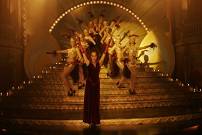|
|
||||
|
|
by Donald Levit  Rachel Samuels’ Dark Streets bears the imprint of her earlier start in painting. The visually striking noir-musical calls up throwbacks like Close to the two latter-named films in its music-driven energy, this one is neither Ry Cooder rock nor Fosse jazziness, but, rather, bluesy in score and twelve original songs either off-camera or accompanying reduced Busby Berkeley-ish dance numbers at the smoky, neon glitzy Tower Club. Etta James, Natalie Cole, B.B. King, Solomon Burke, Chaka Khan, Richie Sambora, Dr. John, Aaron Neville and Marc Broussard (end credits request support for the latter three’s Its “I cut the deal, and I take the blame” beginning actually its ending, the plot is another of those The fable of ambition and corruption, love and betrayal, with a standby swindled inheritance thrown in, is that of the career of naïve Chaz (Gabriel Mann). A wisp of a moustache does not hide how young and inexperienced is this dandyish dresser in ascots. Scantily dressed dancers at his dream club ogle him, but he is fairly abstemious and has only a non-serious fling with brunette singer Crystal (Bijou Phillips, daughter of the Mama and the Papas’ John), whom he has weaned from the cocaine habit of the others. She pines for a more permanent arrangement, but the boss’ heart belongs to the cabaret, behind in repaying loan sharks and beleaguered by the frequent rolling power blackouts in the unspecified fantasy city. Ironically, the cash-challenged owner is the son of Arthur Davenport, a suicide who for thirty-five years co-owned Consolidated Power Company with his brother Nate (Michael Fairman). SPOILER ALERT Chaz glimpses a disappearing woman in black at his father’s niche, and receives that father’s “return to sender” package, addressed to apparent lover Gloria Morton (Carolyn Seymour) and, among other surprises, containing a warning and a toy Wonder Wheel. He is rescued from creditors’ murderous hatchet man by a no less sinister figure bottom-lit in black and leather with a badge in his wallet and calling himself Lieutenant (Elias Koteas). This two-edged savior from hell brings along Miss Madeleine Bonderont (Izabella Miko), a blonde knockout in looks and as the club’s new “chanteuse.” Crystal and the other girls look daggers at her from the balcony that features throughout for various observers, but Maddie plays coy about granting extra-professional favors to the smitten Chaz, enticing him deeper into perdition. Goons bar Chaz from Consolidated Power stations, followed by run-ins with political powers (Ken Rosier, as Governor), disappearances and subsequent sideshow Ferris wheel reappearances, dubious accidental deaths and outright hushed-up murders. The clueless hero digs but comes no nearer the truth, simultaneously following Uncle’s counsel and bringing Madeleine to his dead father’s cabin. But suddenly he is an outsider in his own place, the secrets he might have uncovered now in the possession of others, who will control and tell him. Too inventive for the many in mixing genres and daring style, Dark Streets “goes directly to our feelings,” as Ingmar Bergman saw it, “film as dream, film as music.” Those viewers willing to give themselves to the serious playfulness and visuals will find their share of rewards. (Released by Samuel Goldwyn Films and rated "R" for some sexual content, drug use and brief violent images.) |
||
|
© 2026 - ReelTalk Movie Reviews Website designed by Dot Pitch Studios, LLC |



